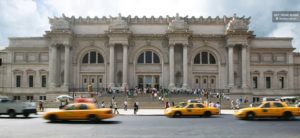The basic tenet of copyright law is that protection is available for “original works of authorship fixed in any tangible medium of expression.” The most common example of a work that is eligible for copyright protection is a painting or sculpture. Once the work is fixed it is afforded protection and others cannot reproduce, make derivatives, publicly display, or distribute the work. But, copyright does not last forever. Once the copyright on a work has expired, it enters the public domain. While Congress has amended the time for copyright protection over the years, it is generally understood that any work created before 1924 has entered the public domain. As such, there is no doubt that the works of the Old Masters displayed in museums are part of the public domain.
Despite this understanding museums, like the Metropolitan Museum of Art, sell reproductions of these works as posters in their gift store and these posters include a copyright notice. So how is it possible that the museum can own the copyright in the poster when the original work is in the public domain?
It is commonly understood that merely reproducing artwork that is in the public domain cannot extend copyright protect or else the expiration of copyright would cease to exist. Therefore, the poster cannot be seen as merely a reproduction of the original work, but rather a completely new work eligible for its own copyright protection. For a work that incorporates material from the public domain or other copyrighted works to garner copyright protection, the creator must disclaim the preexisting material and the material remaining that has not been disclaimed must have some creativity.
Using this framework, the posters produced by museums of their masterworks can only be copyrightable based on the design and creative choices in the poster itself and the underlying work would be disclaimed. Note this does not give museum goers free reign to commercially exploit the photographs they take of the master works displayed. Most museums have a terms of service that patrons agree to when they purchase a ticket to enter which stipulates they are not allowed to use their photos for commercial gain.
Please click here [1] for more information on how Castaybert PLLC can help register, enforce, or protect your copyright.
